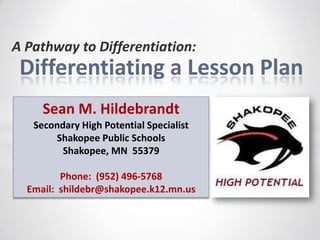
Differentiating a Lesson Plan
- 1. A Pathway to Differentiation: Differentiating a Lesson Plan Sean M. Hildebrandt Secondary High Potential Specialist Shakopee Public Schools Shakopee, MN 55379 Phone: (952) 496-5768 Email: shildebr@shakopee.k12.mn.us
- 3. oTeachers teach better when they systematically study their students (Souza & Tomlinson, 2011) to create differentiated, learner- centered classrooms. oDifferentiated instruction increases stimulation by responding to students’: Readiness Interests and/or Individual learning profiles oBrain studies suggest stimulating environments maximize learning (Rao, 2010; Shaw, 2006)
- 4. Differentiation is a teacher’s response to learner needs shaped by mindset and guided by general principles. Teachers can differentiate through content, process, or product according to students’ readiness, interest, or learning profile. - Carol Ann Tomlinson (1999)
- 5. Consider the Content & Literacy standard(s) being addressed. Will all students learn the same material? (Content) Consider the students ability levels. Can you teach the material in the same way to all students? (Process) Consider the assessments. How will students demonstrate mastery? (Pre/Form/Sum & Product)
- 6. Consider the physical environment. What conditions are needed for the lesson? Consider classroom behaviors. Will affective issues interrupt the lesson? Consider materials available. Will materials force changes in the process?
- 7. What is being taught? Select the common core (literacy/content) standards to address Pre-assess to identify students prior knowledge base Design flexible opportunities via: Alternative mini-lessons Enrichment projects Accelerate curriculum Tools: Learning contracts, curriculum compactor, richer & deeper text
- 8. Process: How the students are taught. Plan varied activities based on: Readiness: matching complexity of a task to student's level of skill and understanding Interest: give topic choices so that students make personal connections to a specified goal. Learning profile: match activity to student’s identified learning modality or interest, or intelligence preference. Bloom’s New Taxonomy
- 9. Product: How the demonstrate content or skill mastery. Design project menus that take student interests & learning preferences into account Tools: Tic-Tac-Toe menus & project matrixes ideabackpack.blogspot.com
- 12. Differentiation & the Brain: How Neuroscience Supports the Learner Friendly Classroom, David A. Sousa & Carol A. Tomlinson. (2011). Shaw, P., Greenstein, D., Lerch, J., Clasen, I., Lenroot, R., Gogtay, N., et al. (2006). Intellectual ability and cortical development in children and adolescents. Nature, 440, 676-679. Rao, H., Betancourt, L., Giannetta, J. M., Brodsky, N. L., Korczykowski, M., Avants, B. B., et al. (2010). Early parental care is important for hippocampal maturation: Evidence from brain morphology in humans. Neurolmage, 49, 1144-1150.
